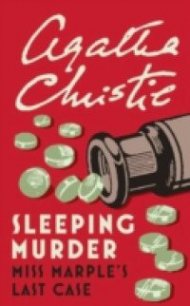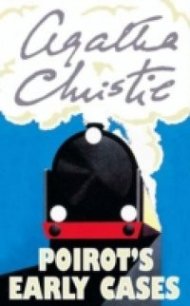Murder on the Orient Express - Christie Agatha (читать книги полные .TXT) 📗
“And then?” said M. Bouc.
“That we must discuss,” Poirot said with a warning glance.
He held up the tunic. A button, the third down, was missing. Poirot slipped his hand into the pocket and took out a conductor’s pass-key, used to unlock the doors of the compartments.
“Here is the explanation of how one man was able to pass through locked doors,” said M. Bouc. “Your questions to Mrs. Hubbard were unnecessary. Locked or not locked, the man could easily get through the communicating door. After all, if a Wagon Lit uniform, why not a Wagon Lit key?”
“Why not indeed?” returned Poirot.
“We might have known it, really. You remember that Michel said that the door into the corridor of Mrs. Hubbard’s compartment was locked when he came in answer to her bell.”
“That is so, Monsieur,” said the conductor. “That is why I thought the lady must have been dreaming.”
“But now it is easy,” continued M. Bouc. “Doubtless he meant to relock the communicating door, also, but perhaps he heard some movement from the bed and it startled him.”
“We have now,” said Poirot, “only to find the scarlet kimono.”
“True. And these last two compartments are occupied by men.”
“We will search all the same.”
“Oh! assuredly. Besides, I remember what you said.”
Hector MacQueen acquiesced willingly in the search. “I’d just as soon you did,” he said with a rueful smile. “I feel I’m definitely the most suspicious character on the train. You’ve only got to find a will in which the old man left me all his money, and that’ll just about fix things.”
M. Bouc bent a suspicious glance upon him.
“That’s only my fun,” added MacQueen hastily. “He’d never have left me a cent, really. I was just useful to him – languages and so on. You’re likely to be out of luck, you know, if you don’t speak anything but good American. I’m no linguist myself, but I know what I call Shopping and Hotel – snappy bits in French and German and Italian.”
His voice was a little louder than usual. It was as though he were slightly uneasy over the search in spite of his expressed willingness.
Poirot emerged. “Nothing,” he said. “Not even a compromising bequest!”
MacQueen sighed. “Well, that’s a load off my mind,” he said humorously.
They moved on to the last compartment. The examination of the luggage of the big Italian and of the valet yielded no result.
The three men stood at the end of the coach looking at each other.
“What next?” said M. Bouc.
“We will go back to the dining-car,” said Poirot. “We know now all that we can know. We have the evidence of the passengers, the evidence of their baggage, the evidence of our eyes… We can expect no further help. It must be our part now to use our brains.”
He felt in his pocket for his cigarette case. It was empty.
“I will join you in a moment,” he said. “I shall need the cigarettes. This is a very difficult, a very curious, affair. Who wore that scarlet kimono? Where is it now? I wish I knew. There is something in this case – some factor – that escapes me! It is difficult because it has been made difficult. But we will discuss it. Pardon me a moment.”
He went hurriedly along the corridor to his own compartment. He had, he knew, a further supply of cigarettes in one of his valises.
He got it down and snapped back the lock.
Then he sat back on his heels and stared.
Neatly folded on the top of the case was a thin scarlet silk kimono embroidered with dragons.
“So,” he murmured. “It is like that. A defiance. Very well, I take it up.”
Part III. Hercule Poirot Sits Back and Thinks
1. Which of Them?
M. Bouc and Dr. Constantine were talking together when Poirot entered the dining-car. M. Bouc was looking depressed.
“Le voila,” said the latter when he saw Poirot. Then he added, as his friend sat down, “If you solve this case, mon cher, I shall indeed believe in miracles!”
“It worries you, this case?”
“Naturally it worries me. I cannot make head or tail of it.”
“I agree,” said the doctor. He looked at Poirot with interest. “To be frank,” he said, “I cannot see what you are going to do next.”
“No!” said Poirot thoughtfully.
He took out his cigarette case and lit one of his tiny cigarettes. His eyes were dreamy.
“That, to me, is the interest of this case,” he said. “We are cut off from all the normal routes of procedure. Are these people whose evidence we have taken speaking the truth, or lying? We have no means of finding out – except such means as we can devise ourselves. It is an exercise, this, of the brain.”
“That is all very fine,” said M. Bouc. “But what have you to go upon?”
“I told you just now. We have the evidence of the passengers and the evidence of our own eyes.”
“Pretty evidence – that of the passengers! It told us just nothing at all.”
Poirot shook his head.
“I do not agree, my friend. The evidence of the passengers gave us several points of interest.”
“Indeed,” said M. Bouc sceptically. “I did not observe it.”
“That is because you did not listen.”
“Well, tell me, what did I miss?”
“I will just take one instance – the first evidence we heard, that of the young MacQueen. He uttered, to my mind, one very significant phrase.”
“About the letters?”
“No, not about the letters. As far as I can remember, his words were: ‘We travelled about. Mr. Ratchett wanted to see the world. He was hampered by knowing no languages. I acted more as a courier than a secretary.’ ”
He looked from the doctor’s face to that of M. Bouc.
“What? You still do not see? That is inexcusable – for you had a second chance again just now when he said, ‘You’re likely to be out of luck if you don’t speak anything but good American.’ ”
“You mean–?” M. Bouc still looked puzzled.
“Ah, it is that you want it given to you in words of one syllable. Well, here it is! M. Ratchett spoke no French. Yet, when the conductor came in answer to his bell last night, it was a voice speaking in French that told him that it was a mistake and that he was not wanted. It was, moreover, a perfectly idiomatic phrase that was used, not one that a man knowing only a few words of French would have selected. ‘Ce n’est rien. Je me suis trompe.’ ”
“It is true,” criedConstantine excitedly. “We should have seen that! I remember your laying stress on the words when you repeated them to us. Now I understand your reluctance to rely upon the evidence of the dented watch. Already, at twenty-three minutes to one, Ratchett was dead–”
“And it was his murderer speaking!” finished M. Bouc impressively.
Poirot raised a deprecating hand.
“Let us not go too fast. And do not let us assume more than we actually know. It is safe, I think, to say that at that time – twenty-three minutes to one – some other person was in Ratchett’s compartment, and that that person either was French or could speak the French language fluently.”
“You are very cautious, mon vieux–”
“One should advance only a step at a time. We have no actual evidence that Ratchett was dead at that time.”
“There is the cry that awakened you.”
“Yes, that is true.”
“In one way,” said M. Bouc thoughtfully, “this discovery does not affect things very much. You heard someone moving about next door. That someone was not Ratchett, but the other man. Doubtless he is washing blood from his hands, clearing up after the crime, burning the incriminating letter. Then he waits till all is still, and, when he thinks it is safe and the coast is clear, he locks and chains Ratchett’s door on the inside, unlocks the communicating door through into Mrs. Hubbard’s compartment and slips out that way. In fact, it is exactly as we thought, with the difference that Ratchett was killed about half an hour earlier and the watch put on to a quarter past one to create an alibi.”



